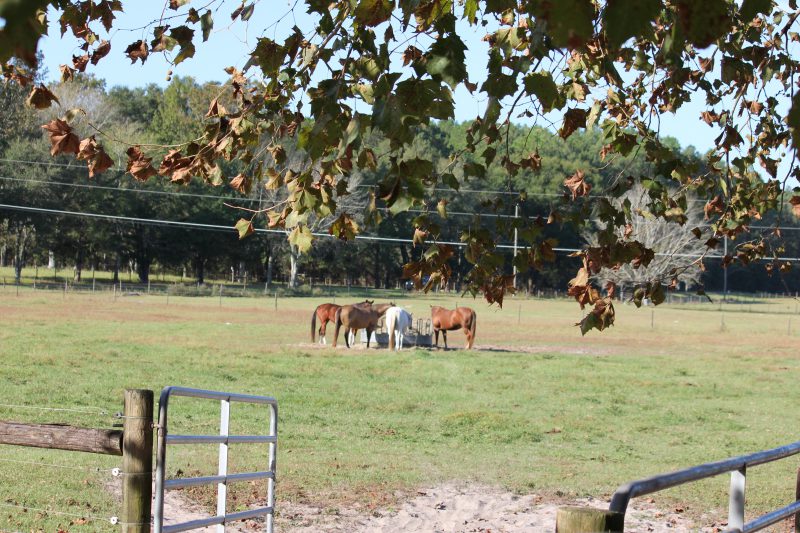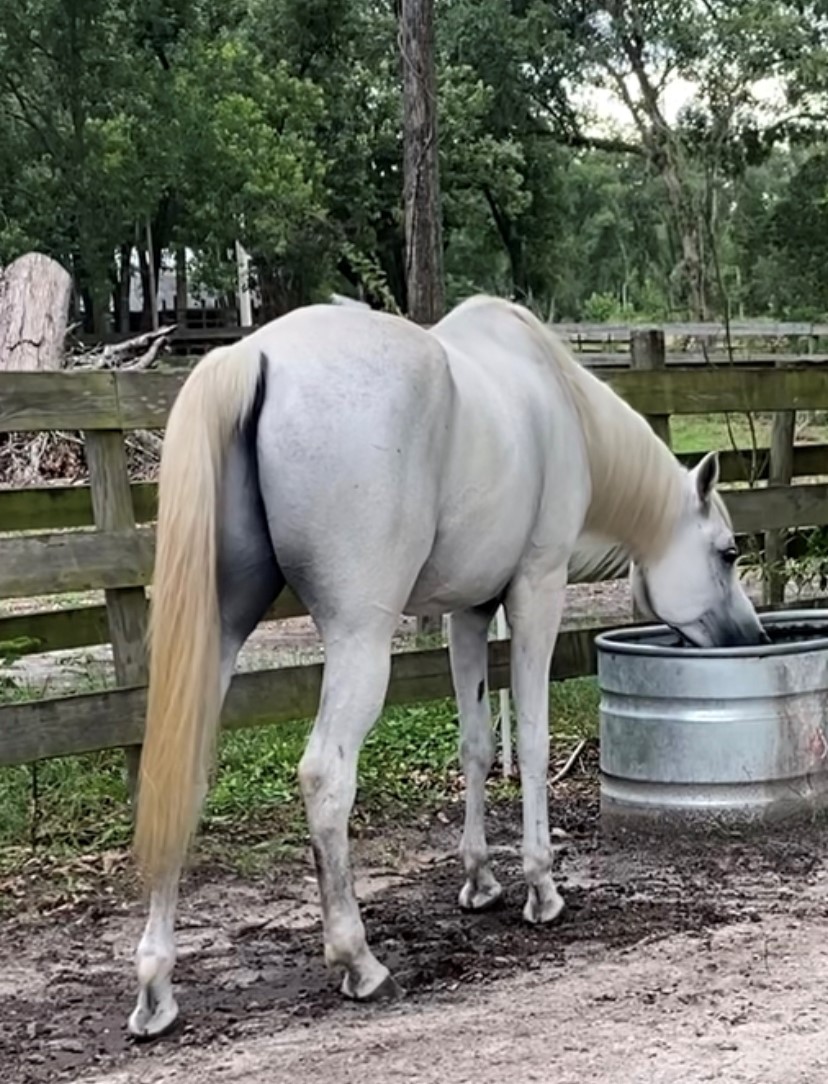Saundra TenBroeck, UF/IFAS State Extension Horse Specialist, Department of Animal Sciences
Heading into winter months, cold weather can lead to a higher incidence of impaction colic. Understanding the challenges that come with the changing of seasons allows us to develop management strategies to reduce the risk of colic.
–
Increasing hay as pastures decline
Horses typically graze 10-17 hours per day. As pasture grasses go dormant for the winter, owners need to provide hay at a rate and frequency that allows the GI tract to have a relatively constant stream of forage. If you plan to offer hay free choice, make hay available while there is still pasture grass. This will prevent overconsumption of hay and allow them to adjust to the hay over time. The moisture content of hay is around 15% while pasture grass is 50 – 90%. A gradual shift from grass to hay will help prevent impaction colic. If your horses are stalled part of the day, it is still important to keep hay in front of them. The use of “slow feeder” hay nets is a great way to meter the hay and reduce waste.

In shortened days of late October, bahiagrass growth is very minimal. Start feeding hay before pasture forages are completely gone to prevent overconsumption of hay. Credit: Saundra TenBroek, UF/IFAS
–
Maintaining Water intake in Winter

Horses prefer to drink water in the 45 – 65° F range. Freshen the trough with ~70° well water in the evening and early morning to encourage consumption on the coldest days. Credit: Carissa Wickens, UF/IFAS
Water is the least expensive but most important nutrient you provide to your horse. Maintaining ample water intake is crucial to ensuring horse health year-round. Most horses in Florida are unaccustomed to drinking extremely cold water. Consequently, when a cold snap hits, water intake may drop. Horses prefer to drink water in the 45 – 65° F range. They should consume about a gallon of water per 100 pounds of body weight per day (10 – 12 gallons/day for 1100 lb. horse). If the water temperature drops to 32° F, intake may drop to as little as 1-3 gallons per day. As water intake decreases, incidence of impaction colic increases.
When the weather forecast indicates a cold front is moving in, there are several things you can do to prepare and hopefully prevent impaction colic.
- Increase the hay/forage portion of the ration 24 hours in advance of the forecasted cold conditions. The higher intake of dry matter will stimulate water consumption. In addition, forage digestion generates more internal heat than digestion of concentrates.
– - Top dress the concentrate portion of the diet with loose salt to stimulate thirst.
_ - Mix 2-3 gallons of hot water into the concentrate portion of the ration 15 minutes before feeding and offer as a wet mash during cold periods.
– - Offer 10 gallons of warmed water daily during cold periods. Consider adding a dollop of molasses to a bucket of warm water and offer as a “hot toddy” at bedtime.
_ - Break ice frequently to allow free choice access to water.
– - Well water is about 70 degrees so “freshen” the trough or bucket morning and evening.
–
Deworming
Most strategic deworming protocols recommend fall and spring treatment with additional treatments during the year only if fecal egg counts indicate there’s a problem. The combination of mild temperatures in the fall months combined with grazing shorter pastures make the fall a prime time for parasite loads to increase. A heavy parasite load can also increase the incidence of colic. Use an effective dewormer in the fall to reduce winter weight loss due to nutrients going to internal parasites.
–
Providing exercise
When the weather changes abruptly, you may limit turn out time or bring pastured horses inside. Exercise aids in gut motility and helps stimulate thirst. It is important for your horse’s health to encourage daily exercise, even in inclement weather.
–
Take Home Message: Most winter impaction colic is related to dehydration.
–
Further reading:
–
Cold Weather Feeding Practices for Horses | Extension Horses
–
Colic: Minimizing its Incidence and Impact in your Horse | AAEP
–
Winter Care for Horses | Extension Horses
–
- End of Life Issues – Euthanasia:A Horse Owner’s Final Act of Care - October 4, 2024
- Economic Impact Study Indicates the Florida Equine Industry Remains Strong - April 12, 2024
- Management Strategies to Prevent Seasonal Impaction Colic in Horses - October 27, 2023
